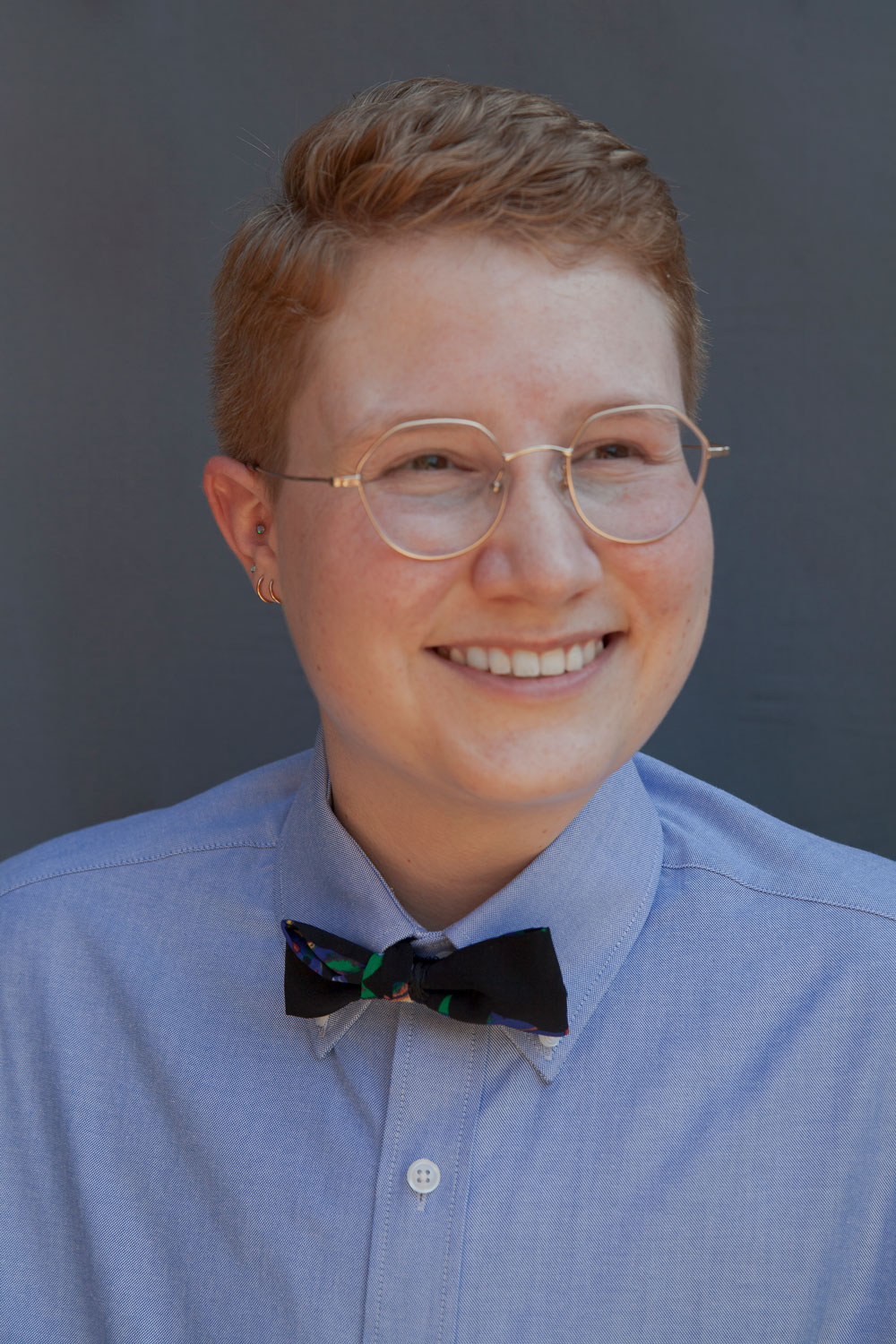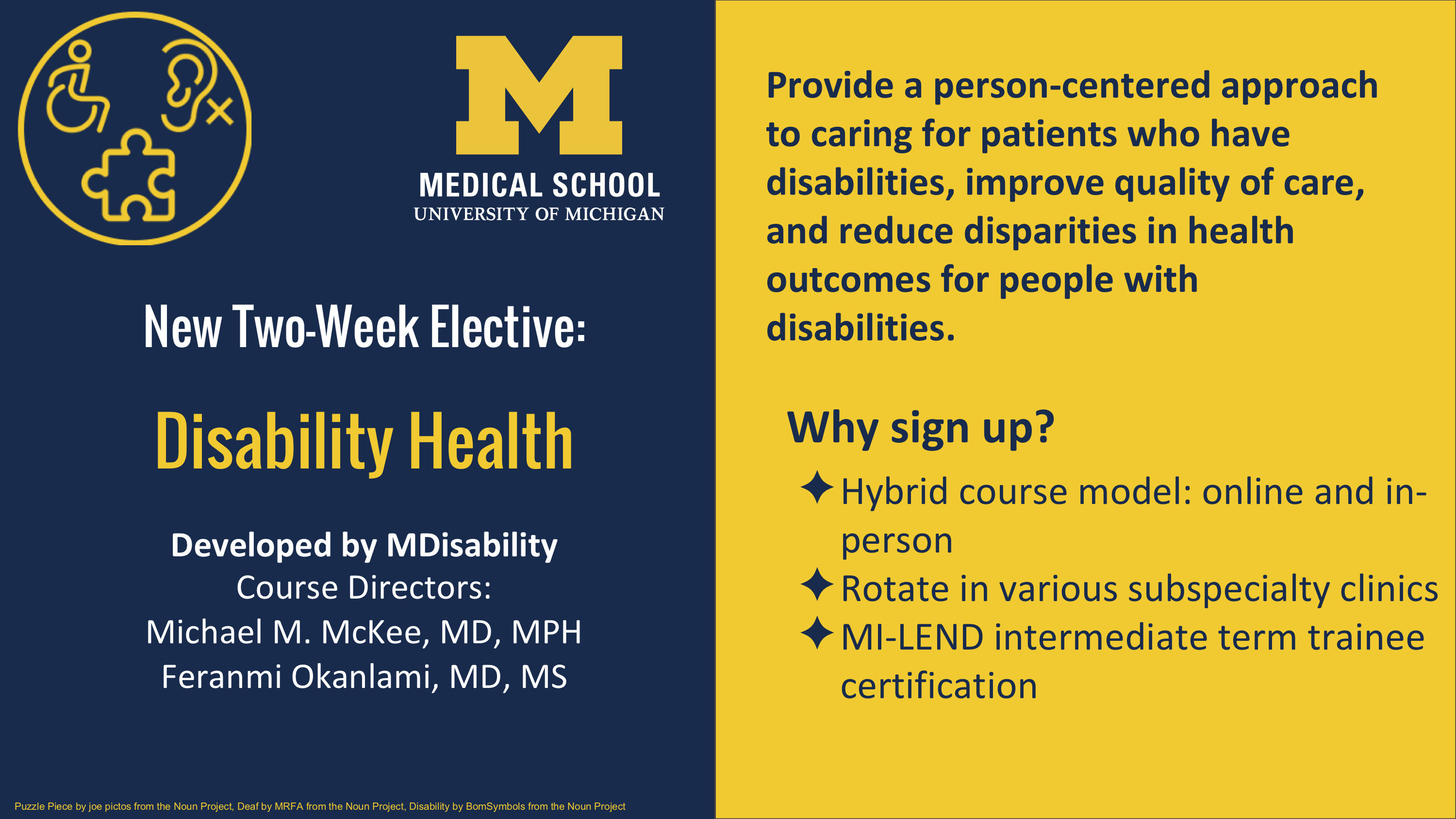
Miles McGovney, a fourth-year medical student at the University of Michigan Medical School, has a passion for caring for those with disabilities. Prior to beginning medical school in 2017, McGovney cared for young and older individuals with disabilities.
“My goal is to work with individuals with intellectual and mental disabilities,” they said. “Aging and health care is a specific interest of mine.”
McGovney, who will graduate in 2021 with a medical degree, plans to practice internal medicine and pediatrics. They are the first medical student to take part in the school’s inaugural Disability Health Elective. The elective, which took place in September, was created through the Department of Family Medicine’s MDisability Program, a collaborative program focused on improving the inclusion of people with disabilities in healthcare research, education, practice and community engagement.
The two-week elective, to the program leadership’s knowledge, is the first of its kind in the country and is supervised by Michael M. McKee, MD, M.P.H., associate professor of family medicine and director of MDisability, and Oluwaferanmi O. Okanlami, M.D., M.S., assistant professor of family medicine, physical medicine & rehabilitation, and urology; director of Adaptive Sports & Fitness; as well as interim director for Services for Students with Disabilities.
Medical student Allyse Zondlak was also key in developing and arranging course content.
The course is intended to teach third and fourth-year medical students about best clinical practices in disability health from a variety of disability health experts. Students also learn about disability theory, law, and culture, and the implications for disability policy in healthcare.
McGovney said that they found working with members of the community who have disabilities the most valuable experience, including listening to disabled patients talk about their lives and the challenges they face.
The new course is also being offered in April 2021, and one student has already signed up as of October. In general, the elective can accommodate one to two medical students during this first-year launch.
The elective provides what faculty hope are meaningful experiences through rotations among clinics specializing in disability-based care for specific populations (e.g., Deaf Health, Adaptive Sports Medicine, Spinal Cord Injury, Developmental Behavioral Pediatrics, Cerebral Palsy, Gynecology for Intellectual and Developmental Disabilities and Low Vision).
“They did a fantastic job managing those issues (around clinic time) and did a fantastic job scheduling me at rotations where I didn’t have to fight to be the one in the clinic room,” McGovney said.
The elective also includes small group discussions and online training with the Leadership Education in Neurodevelopmental and Related Disabilities (LEND) program, and aims to connect students to the local disability community and resources.
McGovney said working with faculty members who treat disabled patients was an invaluable educational experience.
“We had some fantastic lectures on disabilities,” McGovney said. “Dr. McKee is a rock star, absolutely. He taught me a lot about general health care. I also worked with Dr. Edward Hurvitz, who is an icon. He gave me the lecture about cerebral palsy, which was fantastic.”
The overarching goal of the disability health elective is to reduce health care disparities and improve health outcomes for patients with disabilities by preparing medical students to provide informed, person-centered care. Medical student Zondlak sees the course as a catalyst for changing the way future doctors interact with and care for patients with disabilities.

“If we want our future physicians to become agents of change, we have to properly equip them to do so,” she said. “This starts by putting students on the ground where they can see first-hand the challenges individuals living with a disability face trying to navigate our current healthcare system.
“Once students have a better understanding of how these day-to-day challenges can contribute to health disparities, they can begin to appreciate how small, actionable changes in their future practice could make a big difference for others.”
And though the elective is a relatively brief two weeks, Zondlak feels that is adequate time to educate medical students about caring for patients with disabilities.
“It doesn’t take very long after interacting with a patient living with a disability to realize the impact of the challenges they face everyday,” she said. “Michigan Medicine is lucky enough to have clinics and providers that are devoted specifically to caring for patients with disabilities, which means each of the experiences we offer has enough high-yield exposure to educate students.”
Medical students interested in the FAMMED 8204 course can enroll in it through OASIS. For more information, they can reach out to MDisability Program Coordinator Dawn Michael at [email protected].



